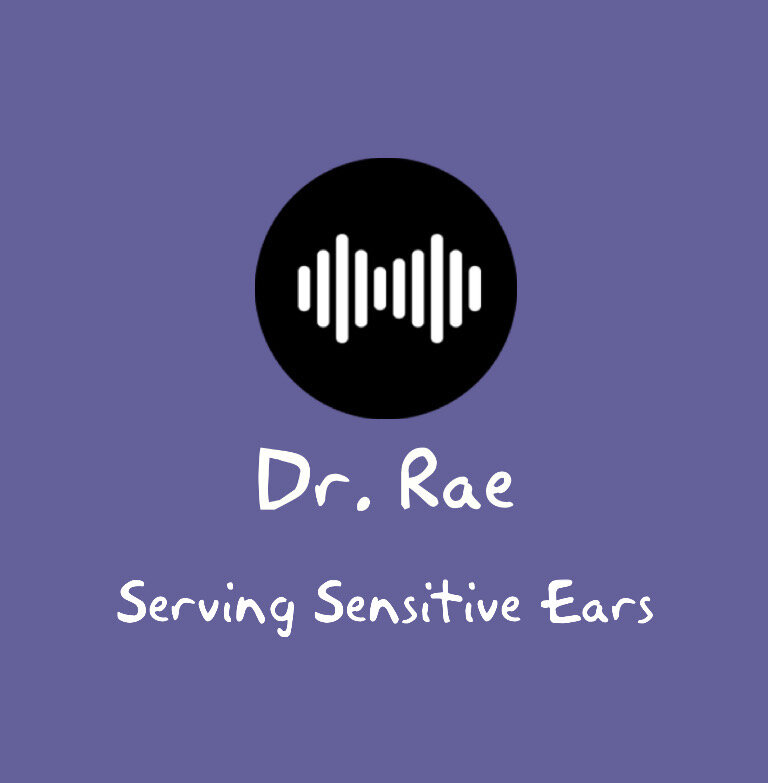Welcome to Dr. Rae’s APD and Sound Sensitivities Blog!
I’m glad you’re here. This blog is where I share stories, insights, and resources on hearing, sound sensitivity, neurodivergence, and the ways our sensory systems shape daily life.
If you’re looking for something specific, try the search bar to the right of this page. You can type in keywords, topics, or phrases, like “auditory processing,” “misophonia,” or “low-gain hearing aids,” and the search will bring up all related posts. It’s a quick way to explore exactly what you’re curious about without scrolling through every article.
Please take your time to browse around…
I hope you find something here that resonates with you!
If you have any requests for new blog topics, please let me know at dr.rae@drraestout.com.
I Read the Room and It Was Full of Bees: “When therapists policed my trauma”
That’s how it started. And yes, I posted it in a therapist group on purpose. I read the room. I saw the trend. I stepped into it anyway.
Why?
Because I needed closure. Not revenge, at least not the cartoon-villain kind. The kind where the pain is so old, so buried, that even being seen in your truth feels like rebellion.
I wanted to cauterize it.
I wanted to confront them. With the pain they caused. With the silence they upheld. With the system they still protect.
And yes, it was healing to get into that fight.
You can tell me to read the room. But I did. And it was full of bees. Buzzing, stinging, swarming. The kind of room where trauma isn’t just triggered, it’s dismissed. Sanitized. Softened until it doesn’t threaten anyone anymore.
I needed it to sting back.
John, This Is Why Your Brain Gets Tired Listening to Accents
Dear John,
A little while ago, an admin tagged me in a post to see if I could answer your question from an audiology and auditory processing perspective, that is, why some of us have such a hard time understanding people with accents, especially when others seem to manage just fine.
I gave you a quick answer. It was honest, but it was also rushed. And the more I thought about it, the more I realized it deserved something deeper. Because this isn’t only about accents. It’s about how language works, how much energy listening can take, and how communication access isn’t evenly distributed.
So here’s the real answer. Not just for you, but for anyone who has sat in a conversation pretending to follow while their brain quietly hit overload.
Don’t Throw the Baby Out with the Bathwater: A Warning for Auditory Processing Disorder
The saying “don’t throw the baby out with the bathwater” comes from 16th-century Germany. It’s a vivid reminder not to discard something precious when trying to get rid of what’s problematic. Over time, it became shorthand for a recurring human error: abandoning the good along with the bad in a rush to clean house.
Lately, I’ve been thinking about this in the context of auditory processing disorder (APD).
There’s no question the testing is imperfect. Many clinicians have pointed out that results can vary wildly depending on the battery used, the child’s fatigue level, or the evaluator’s background. Follow-up support is often inconsistent or nonexistent. Diagnoses are sometimes given with no meaningful explanation, no classroom guidance, and no long-term strategy. These are real problems, and they deserve to be addressed.
But some people are proposing abandoning the diagnosis entirely… and that is the “bathwater” move.
Because no matter how messy the water gets, there’s still a baby in there.
Who Gets Language? The Arbitrary Gatekeeping of ASL, Access, and Human Potential
That girl changed my life. If it hadn’t been for her, I wouldn’t be here doing what I do. I wouldn’t be a fluent signer. I wouldn’t have spent years immersed in the Deaf community. I wouldn’t have studied at Gallaudet. I wouldn’t have taken ten years of ASL classes or built a career in supporting kids who fall through the cracks of spoken language.
Sign language has given me comfort, community, and education. It’s helped me process the world, especially as someone who is autistic, ADHD, and sensitive to sensory overload. It’s not just a communication tool. It’s a survival tool.
Bruschetta Isn’t the Cure: Misophonia, Sensory Respect, and the Limits of Exposure
I’m an autistic audiologist with personal experience of sensory overload, and I approach misophonia from a place of lived empathy. Instead of forcing exposure to triggers, I reduce the sensory load using low-gain hearing aids, customized sound shaping, and patient-controlled programs. It's not about tolerating what hurts... it’s about creating safety so people can function and choose when to engage. I offer real-world trials, not sales pitches, and I work virtually across states to meet people where they are. If you’ve ever hated a raw tomato and been told to just keep eating them, you’ll understand my approach. You don’t have to swallow what doesn’t sit right.
A Tomato Is Not Just a Tomato
Salon Summary: July 30, 2025
This week’s salon brought together a powerful cross-section of lived and professional experience:
Autistic adults and ADHDers
An audiologist, a psychologist, and a speech-language pathologist
Parents of kids and adults with misophonia
Adults with chronic illness and trauma survivors
Service dog handlers and neurodivergent professionals
Some attendees wore many of those labels. Others were still figuring it out.
Pass the Screen, Fail the Kid? The Hidden Gaps in Early Hearing Tests
You want to understand what went wrong? You have to start at the very beginning.
Not when the speech delay showed up. Not when the reading fell apart. Not when the meltdowns became daily. Start at birth.
Because most babies get a hearing screen before they ever leave the hospital. Usually it’s either Otoacoustic Emissions (OAE) or Auditory Brainstem Response (ABR). And if they pass, the box is checked and they’re cleared as “normal.” But let me be very clear. Those tests don’t tell you what you think they do.
OAE only tells you that the outer hair cells in the cochlea bounce back sound. It doesn’t tell you whether the signal makes it to the brain. It doesn’t tell you if the auditory nerve works. It doesn’t tell you whether the child can hear speech or understand it.
We call these “hearing tests,” but they’re not testing hearing the way people actually experience it. They test transmission. They don’t test perception. They don’t test clarity. They don’t test meaning.
Clinician Over Technician
Sometimes you have to disregard the test findings entirely. Be a clinician, not a technician. Standardization can fail. Sometimes it’s not just insufficient, it’s irrelevant.
There are things you can’t observe directly, where the tests don’t work at all. You might see debris on the bank and assume that’s the problem, when the real issue is upstream. The snowpack melted. That’s what caused the flood. Or there’s a bottleneck or constriction in the channel, causing turbulence and overflow. To really understand what’s happening, you need more than reported symptoms or test results. You need intuition. You may need to swim upstream.
In many cases, what gets labeled as a language disorder is actually language deprivation due to auditory deprivation. The child couldn’t clearly perceive language in the first place. Fix the hearing. Fix the perception. The downstream symptoms often ease on their own.
I’m not saying they won’t need therapy if you wait long enough. But if you intervene early, before the system reorganizes itself around the deprivation, you might prevent years of compensatory effort and trauma. You might save a child from struggling to learn a language they never fully heard.
That’s why I keep saying auditory processing disorder may not be a disorder in the way people think. It’s not singular. It’s not neatly divided into a few subtypes. Our definition and our diagnosis need serious rethinking.
Soft Hits Hard
I created this song to help people better understand misophonia.
It’s not about volume. It’s not about being dramatic or picky. It’s about how certain soft sounds (breathing, chewing, clicking, whispering) can feel physically threatening to someone whose brain can’t filter them out. These sounds bypass logic and go straight to the nervous system.
Misophonia can quietly unravel relationships. It creates guilt, distance, and frustration in families that care deeply but don’t know how to bridge the disconnect. You can’t see it. You can’t measure it. But it’s real. And it affects how people live, work, sleep, and connect with others.
This song is one person’s way of making that invisible experience visible.
Of saying, “You’re not alone.” And maybe, “Now you get it.”
“The softer the sound, the harder it sticks. The quieter it is, the louder it hits.”
Please feel free to listen and share. Especially with someone who’s trying to understand.
More Than a Metaphor: Why AI Use Feels Like an ASL Interpreter
I know my views aren’t always politically correct.
I ramble sometimes, because I’m human, not AI. So instead of juggling every point someone raised, I’m focusing on one.
I’m walking the track using speech-to-text right now. This is all me. No AI. Or at least, it was until I ran into the 8000-character limit. That’s when I asked AI to help me shorten it. Not to rewrite it, just to fit it into the box.
Eventually, I gave up and turned it into a full-fledged post.
You may not agree with me, and that’s okay. I agreed with parts of what was said too. But I want to talk about ASL and interpreting, which I care deeply about.
Since we’re already in uncomfortable territory, I’ll bring up another one: Cued Speech.
I was a certified ASL interpreter. I grew up in the Deaf community and attended Gallaudet for two years. I know how human interpretation works, and how often it fails. Many interpreters shouldn’t be interpreting. Some lack the linguistic or cognitive skills, and most DHH students don’t know what they’re missing, so they can’t speak up.
It’s like asking someone to raise their hand if they didn’t hear a beep. How would they know?
They only realize there’s a problem when something important gets misunderstood. But even then, how do they know whether the error came from the interpreter or their own processing?










